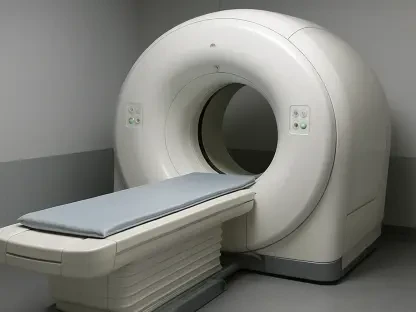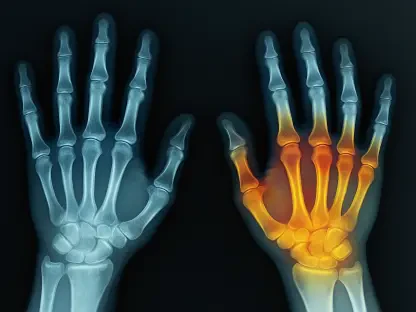The Coalition for Health AI (CHAI) has introduced a groundbreaking registry designed to streamline the adoption of artificial intelligence (AI) in the healthcare industry. This new model card registry is set to revolutionize how hospitals and developers access and share information about AI tools. By providing a centralized platform, CHAI aims to facilitate the evaluation and ethical implementation of AI technologies in healthcare settings.
The Growing Role of AI in Healthcare
The integration of artificial intelligence into the healthcare sector is a rapidly advancing frontier, with algorithms increasingly employed by providers to enhance operational efficiencies. According to a survey conducted by the Healthcare Information and Management Systems Society (HIMSS), an overwhelming 86% of respondents reported using AI within their organizations, predominantly for administrative functions. Tasks such as clinical notetaking, patient interactions, and staff scheduling are being automated, reflecting a broader trend toward reliance on AI to improve efficiency and reduce the burden of routine tasks on healthcare professionals. This dynamic underscores AI’s emerging prominence as an indispensable component of healthcare operations.
Increasing Utilization of AI
While administrative applications dominate the current utilization of AI in healthcare, the technology’s potential extends far beyond these basic functions. The scope and scale of AI adoption are rapidly evolving, driven by the quest for operational excellence in the industry. However, the typical implementation timeline is relatively recent for many organizations. The HIMSS survey revealed that 33% of those employing AI have only integrated the technology within the last six months, indicating an industry still in the early stages of broad-scale AI implementation. This nascent stage represents both a significant opportunity and a challenge for healthcare entities striving to maximize AI’s benefits while overcoming initial barriers to technological adoption.
Expanding Clinical Applications
A burgeoning interest in applying AI to clinical functions is also evident across healthcare organizations. Providers are exploring AI’s potential to revolutionize patient care, from personalizing treatment plans based on individual patient data to assisting clinicians in making accurate diagnoses. Such applications could fundamentally transform the patient experience, fostering a more nuanced and responsive approach to healthcare. However, while the prospects are promising, the practical integration of AI into clinical workflows remains in its infancy. Healthcare organizations are still navigating the complexities of this transition, with many just beginning to explore these advanced AI applications. This phase of exploration is crucial for understanding the true impact and intricacies of AI deployment in clinical settings.
Challenges in AI Adoption
Despite the enthusiasm for AI’s potential, healthcare organizations face notable obstacles in adopting these advanced technologies. The fast-paced evolution of AI tools presents a significant challenge, making it difficult for providers to stay updated and informed. Additionally, ensuring the ethical deployment of AI remains a pressing concern, necessitating rigorous standards and oversight mechanisms.
Navigating Rapid Advancements
The rapid advancements in AI technology mean that a plethora of tools and solutions are constantly emerging, each vying for attention in the healthcare market. For hospitals and healthcare providers, the task of navigating through these numerous options can be daunting. The procurement process requires a thorough analysis of technical documents, white papers, and marketing presentations, all of which claim various benefits and capabilities of the tools on offer. This overload of information can create confusion and make it challenging for healthcare providers to make informed decisions. The complexity is further exacerbated by the lack of standardized information presentation, which can lead to inconsistencies and inefficiencies in evaluating potential AI tools.
Ensuring Ethical Implementation
Equally important is the ethical dimension of AI adoption in healthcare. Providers are understandably cautious about incorporating AI technologies too quickly, given the potential risks to patient safety and privacy. The perceived rapid pace of AI adoption, coupled with the absence of comprehensive oversight mechanisms, has raised concerns about the ethical implications of these technologies. There is a growing need for healthcare organizations to implement AI responsibly, ensuring that the deployment of such technologies does not inadvertently cause harm to patients. Establishing clear, robust standards is essential to safeguarding ethical practices in the use of AI within healthcare, aligning technological advancements with the fundamental principle of “do no harm.”
CHAI’s Solution: Model Card Registry
In response to these challenges, CHAI has developed the model card registry, a novel approach aimed at facilitating the ethical and efficient adoption of AI in healthcare. This registry standardizes the presentation of information on AI tools, making it easier for healthcare providers to evaluate and compare different products.
Standardizing Information Presentation
The core innovation of CHAI’s solution lies in the model cards, which are designed to function similarly to nutrition labels on food products. These model cards detail an AI model’s development process, capabilities, and limitations, providing clear and standardized information that aids in informed decision-making. By consolidating critical information into a uniform format, the model card registry allows healthcare providers to quickly and efficiently assess the suitability of different AI tools for their specific needs. This standardization is pivotal in demystifying AI products, making the procurement process more transparent and manageable for health systems.
Collaboration with Avanade
The development of this registry was made possible through a collaboration with Avanade, a joint venture between tech giants Microsoft and Accenture. This partnership ensures that the registry leverages cutting-edge technological expertise and industry best practices. The centralized platform provided by the registry allows hospitals to access a comprehensive repository of model cards, streamlining the evaluation process. For AI developers, this platform offers a valuable opportunity to present their products to potential buyers in a transparent and standardized manner. This collaboration between healthcare providers and tech developers fosters a more efficient and open marketplace for AI tools, ultimately benefiting all stakeholders involved.
The Path Forward
As the registry gains traction, CHAI continues to refine its approach, incorporating feedback from various stakeholders to enhance the utility and relevance of the model cards. This ongoing process is essential to ensuring the registry remains a dynamic and responsive tool for the healthcare industry.
Refining the Model Card Template
CHAI released a draft of its model card template for public comment, a move that has generated diverse feedback. Stakeholders from different sectors have provided input, reflecting the varied needs and perspectives within the healthcare and AI communities. While no changes have been made to the draft yet, CHAI continues to refine the template to ensure it includes appropriate fields for generative AI products. These products, which generate new, creative outputs, pose unique oversight challenges that require careful consideration. The goal is to create a registry that delivers relevant and actionable information to users, tailored to the specific nuances of each AI product type. This iterative refinement process is vital for maintaining the integrity and effectiveness of the registry.
Building a Network of Quality Assurance Labs
CHAI has unveiled a pioneering registry aimed at streamlining the integration of artificial intelligence (AI) within the healthcare sector. This innovative model card registry is poised to transform the way hospitals and developers access, exchange, and assess information about various AI tools. By introducing a centralized platform, CHAI strives to promote the evaluation, ethical use, and adoption of AI technologies in medical environments.
This registry is designed to offer comprehensive details about AI tools, including their performance, strengths, and potential risks. Hospitals and developers can now make more informed decisions, ensuring that the AI tools they deploy are safe, effective, and align with ethical standards. The platform also encourages transparency by making it easier to scrutinize the methodologies behind AI technologies, fostering a culture of trust and responsibility. Overall, CHAI’s initiative is set to accelerate the integration of AI in healthcare, ultimately enhancing patient care and operational efficiency in medical facilities.









